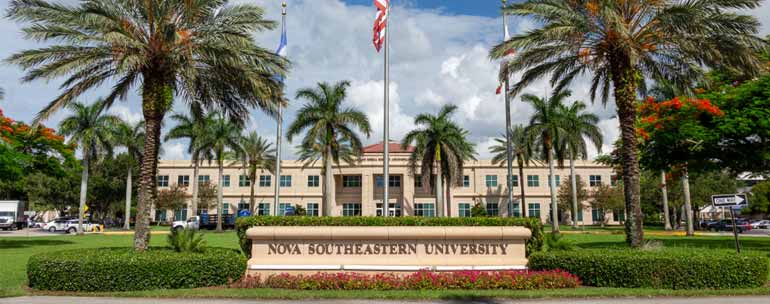If you’re interested in positions of authority within high-level careers, you might benefit from an online doctorate in organizational leadership.

Editorial Listing ShortCode:
Not only can a PhD program give you the education and experience that you’ll need to succeed, but since it’s delivered online, you won’t be bound to a traditional college campus. You can learn at home from the first class until the last.
Online Doctorates in Organizational Leadership
You’ll have several options when it comes to an online PhD in leadership. You could even look outside of the “organizational leadership” label since there are plenty of business-related degrees that offer specializations and concentrations in leadership theory.
Select the program that most interests you to jump to that section of the guide:
There are two main types of organizational leadership degrees, and while they’re quite similar, they have some notable differences as well.
The most straightforward path, however, is a doctorate in organizational leadership. This degree can help prepare you for senior-level positions in a wide variety of agencies and organizations. It has a multidisciplinary focus that brings together subjects like business, finance, economics, education, technology, policy and more.
PhD in Organizational Leadership

A Doctor of Philosophy (PhD) in Organizational Leadership has a strong emphasis on research. You can expect to have to find, track, pull, analyze and systematize data from various sources, and you’ll probably generate a fair bit of your own, especially for your dissertation.
Editorial Listing ShortCode:
After you graduate, your PhD can help qualify you for everything from professorships to pastorships. With this degree, you can pursue work in many different fields, including education, healthcare, human resources, international business and more. You may also stay in academia as a researcher or industry scholar.
EdD in Organizational Leadership

A Doctor of Education (EdD) in Organizational Leadership is designed for students who want to go into research, education or a mixture of both. From a business perspective, it could mean managing organizations from the top down or even teaching or training others to do the same.
Editorial Listing ShortCode:
Practically speaking, an EdD has a bit more of a “real-world” reputation to it. It’s commonly attained by working professionals rather than full-time students, and once you graduate, it can be applied to many different types of careers that involve supervising or instructing others. Every industry needs people to train fresh recruits.
Organizational Leadership Careers & Salaries

What can you do with a doctorate in organizational leadership? The short answer is “a lot.” Depending on your specialization, you could potentially become everything from a university professor to the head honcho of a private business.
Good leadership is a critical component in any industry, so whether you’re interested in business, education, finance, technology, retail or dozens of other fields, an online degree in organizational leadership can open a lot of doors.
The payoff for your education may be quite impressive. According to the Bureau of Labor Statistics, the median salary for a PhD holder is $110,200 per year. High earners in the organizational leadership field can top $100,000 and $150,000 per year.
Some careers that may await you after grad school include:
| Careers | Annual Median Salary |
| Chief Executive | $185,950 |
| Employee Relations Manager | $121,220 |
| Training and Development Manager | $115,640 |
| General and Operations Manager | $103,650 |
| Management Analyst | $87,660 |
| Postsecondary Teacher | $80,790 |
| Business Operations Specialist | $77,420 |
| Social and Community Service Manager | $69,600 |
| Training and Development Specialist | $62,700 |
| Survey Researcher | $59,870 |
It’s important to note that these numbers only represent median salaries. Full pay ranges will be much broader. For example, management analysts can earn anywhere from $50,990 – $156,840 per year, but their median pay is $87,660. Additionally, having an online PhD in leadership will bump the median pay to $110,200.
Keep all of this in mind as you browse wage information. You’ll want to make smart and accurate assessments of your future earning potential before you enroll in a degree program.
Organizational Leadership Specializations & Concentrations

If you already have a specific field of interest, you might want to consider a concentration or emphasis for your organizational leadership degree. It can qualify you for a higher, more specialized tier of jobs, and it can teach you the skills that you’ll need to succeed once you’re there.
- Business Leadership: Designed for future business leaders, this is a concentration that can draw on everything from communication and delegation to organizational design and infrastructure.
- Ecclesial Leadership: This is a track offered by faith-based schools that can prepare students for work in religious institutions or missionary groups.
- Educational Leadership: Educational leadership is a wide-ranging specialization that can cover everything from primary school principals to college deans and school board directors.
- Entrepreneurial Leadership: This specialty is focused on the creation and development of businesses just as much as the management of them. It can be ideal for future consultants, liaisons and problem solvers.
- Global Consulting: With an international focus, this specialization is designed for globetrotting business or government leaders who expect to work a lot with different countries and cultures.
- Healthcare Leadership: Healthcare leadership is focused on running the industry from the non-medical side, so expect classes in administration, ethics, technology and policy.
- Higher Education Administration: Another administrative-based specialty, this one is devoted to education professionals on the postsecondary level.
- Human Resource Development: Human resources is a common career track for organizational leadership students, and this specialization covers the basics, including payroll, talent acquisition, employee conflicts and more.
- Primary Education Leadership: This concentration is for the unique challenges faced by primary-level educators, administrators and directors.
You can also look into professional certifications in your field of choice. Some universities even offer degree credits for them.
Choosing a Doctorate in Organizational Leadership Degree

What makes a good doctorate program? While everyone has their own criteria, there are certain standards and benchmarks that you can use to narrow down your options.
The first thing to consider is the quality of the college. Is it accredited? Does it have professors who are highly accomplished in their fields? Where does it rank with sources like the US News and World Report?
Editorial Listing ShortCode:
Since you’ll be earning your degree online, you’ll also want to consider how classes and fellowships are handled for long-distance learners. You might need to put in some facetime for practicums, dissertations or research opportunities, so what arrangements will you be expected to make with the school?
Finally, consider the degree that you want. Think about the specializations that are available to you and the classes and internships that you can experience. Which schools offer the most bang for your buck in terms of what you’re excited about in a PhD program?
Organizational Leadership Curriculum & Courses

When it comes to PhDs, no two programs are alike. This is especially true for organizational leadership PhDs that can draw from a wide range of academic disciplines depending on its areas of focus.
If you’re concentrating on business leadership, for example, your days might be filled with finance and economics. If you’re studying educational leadership, you might attend a lot of seminars on K-12 infrastructure.
Here’s a small list of courses that you might take for doctorate-level organizational leadership. It’s by no means an exhaustive list, but it should give you a general idea of what your experience might be like as a PhD candidate.
- Organizational Design: One of the most common courses for organizational leadership students, Organizational Design focuses on the different ways that companies structure themselves.
- Research Methods: Since research is a critical component of earning a PhD, you might be expected to take classes in everything from textual analysis to technical writing.
- Data Analytics: These classes have many different names, but they’re all related to the gathering, tracking, analyzing and organizing of data for the purpose of things like organizational efficiency and risk management.
- Leadership Theory and Practice: These courses cover the basics of leadership, including communication, personnel management and strategic decision making. They frequently have an in-person element for real-world practice as an authority figure.
- Policy: Policy is the meter that moves many factions of business, including specialties like healthcare and nonprofit management. These classes cover policy from creation to implementation.
- Business Administration: While you might have covered this topic on the bachelor’s or master’s level, a doctorate program in organizational leadership can help prepare you for administrative challenges as a high-level professional.
- Strategic Foresight: Another area of study that can go by different names, Strategic Foresight revolves around the assessment of markets, economies and sociopolitical trends to predict future business prospects.
- Diversity and Inclusion: It’s become increasingly common for business-related degree programs to offer classes in cultural sensitivity. Some are optional electives while others are required credits for graduation.
- Fieldwork: Many PhD programs have an unavoidable “fieldwork” component that can take the form of residencies, internships, fellowships, practice seminars and more. If you’ll be earning an online degree, you’ll need to figure out how these requirements are handled for distance learners.
- Dissertation: A dissertation is required of almost all PhD programs, so expect to spend one or more semesters on proposals, drafts, reviews and other necessary elements of completing it.
For a closer look at organizational leadership courses on the PhD level, contact the university that you’re interested in and ask about their specific programs.
Admissions Requirements

You’ve probably heard about the difficulty of getting into a good PhD program. While it’s true that competition can be fierce, you can increase your odds of success by understanding the school’s admissions requirements and knocking it out of the park with the entire application process.
- Transcripts: Most PhD programs will ask for your full academic record, including your bachelor’s and master’s degree transcripts.
- GMAT/GRE Scores: While “test-optional” universities are becoming increasingly common, it’s still the norm for doctorate programs to require either the GMAT or the GRE.
- Letters of Recommendation: You’ll need several letters of recommendation from professors and industry professionals. If you know any alumni of the school that you’re applying to, that can be a big bonus.
- GPA: A low GPA isn’t an automatic disqualification for a PhD program, but your admission might come with restrictions.
- Statement of Purpose: This is your chance to personalize your application as well as include any other important accomplishments related to work, research or volunteerism.
You’ll also want to pay attention to deadlines. It’s common for PhD programs to require several months of preparation, so don’t wait until the last minute to start gathering your transcripts and getting your letters of recommendation.
Accreditation

As someone who’s already been through several years of college, you’re probably familiar with the importance of accreditation, but it’s just as relevant to your doctorate program as your bachelor’s and master’s programs.
It can impact things like credits, transfers and financial aid opportunities, and it can play a big role in how future employers determine the legitimacy of your degree.
Editorial Listing ShortCode:
If you need a refresher, here are the three types of accreditation:
- Regional accreditation
- National accreditation
- Programmatic accreditation
Regional and national accreditation is also called “institutional accreditation” since it’s applied to entire universities. Programmatic accreditation, on the other hand, is applied to specific schools, departments and degree programs within universities.
For additional information about accreditation, check out accrediting organizations like the Council for Higher Education Accreditation (CHEA). They even have a searchable database on their website where you can look for specific schools and their accreditation statuses.
Organizational Leadership Professional Organizations

As a future leader of your field, you could benefit tremendously from the resources and networks of professional organizations. Not only do they offer things like scholarships, job boards, certification programs and discounts on industry-specific products and services, but they can put you in contact with people that you’ll need to know for the future.
Here are just a few groups that might interest you as a student of organizational leadership:
- American Leadership Development Association: The ALDA is for leaders who want to train other leaders. It offers a variety of resources for both free and paid members, including articles, awards and networking groups.
- National Management Association: With more than 22,000 members, the NMA is a fast-growing nonprofit organization that hosts everything from speech contests to annual conferences and expos.
- Organization Development Network: Dedicated to organizational development specialists, the OD Network is an international group for managers, directors and leaders of all types.
You can also look for other professional organizations that are dedicated to business leaders and educators. For example, the Association for Talent Development (ATD) might boost your career in human resources. The Academy of International Business (AIB) might be relevant to your interests as a student of global affairs.
What Can You Do With a Doctorate in Organizational Leadership?

A doctorate in organizational leadership can prepare you for high-level careers in a variety of fields.
As befitting the leadership label, many jobs will have “manager,” “director” or “chief officer” in the title. Your coursework should prepare you for the challenges of things like supervising teams and analyzing business structures.
If you choose to concentrate your studies in something specific, you can also find niche or specialized jobs in your chosen field.
For example, if you want to go into human resources, you might become a recruitment officer, benefits administrator, department director or employee relations manager. Even though they’re all senior-level positions in HR, there are different degrees and certificates available for their different focus areas.
What is an Organizational Leadership Degree?

A degree in organizational leadership can help prepare you for the realities of creating, managing and restructuring businesses. It can teach everything from workflow operations to human psychology, and it can lead to jobs in finance, education, healthcare, government, information technology and more.
Editorial Listing ShortCode:
For those who have already obtained a bachelor’s or master’s degree, a PhD or EdD can represent the very top of their educational summit. It might be the last thing that they need to qualify for a high-level job in a position of professional authority.
Are Online PhD Programs Credible?

While you should definitely be on alert for fraudulent colleges that promise fake degrees, there are plenty of real, trustworthy programs for online PhDs and EdDs. Here are a few signs of legitimacy:
- Accreditation. They have regional or national accreditation through their university, or they’ve been programmatically accredited by an industry-recognized organization.
- Reputable origins. Some online degree programs are just extensions or alternatives to the degree programs that are offered on a college’s physical campus. They’ll still come from the same school, have the same professors and require the same academic rigor.
- High standards. Be wary of an online program that makes too many promises or offers too many shortcuts. If it seems too good to be true, it probably is.
Always do your research when it comes to online degrees, especially when they’re as important as a PhD.
What is a Doctorate of Strategic Leadership?

A Doctor of Strategic Leadership (DSL) is a degree that’s quite similar to a Doctor of Philosophy (PhD) or a Doctor of Education (EdD) in Organizational Leadership. They’re all focused on smart, effective leadership in professional settings, and in many cases, employers will view them interchangeably.
They differ in some of the subjects that they teach and some of the specializations that they can have.
Is a PhD in Organizational Leadership Worth it?

While everyone has their own opinion about what constitutes a good, worthwhile degree, a doctorate in organizational leadership can offer a lot of benefits to prospective students.
For starters, it’s a very flexible degree. You can earn either a PhD or EdD in it, and you can choose whether to study leadership as a general subject or with a specialized focus in a particular field.
An organizational leadership degree can also open doors in many different industries. Whether you’re interested in business, retail, healthcare, government or even religion, every industry needs leaders.
Last but not least, a doctorate in organizational leadership can be rewarding. It isn’t uncommon for the top earners of the field to reach six figures or more. It’s definitely a degree that has the potential to pay for itself down the line.
How Long Does it Take to Get a PhD in Organizational Leadership?

It typically takes anywhere from 3 – 5 years to get an online PhD in organizational leadership. Full-time students usually graduate faster than part-time students.
Your timetable can also depend on the coursework and fieldwork requirements of your particular university: If you’re enrolled in a program that has a lot of practicums, you might take longer to finish than someone with a more self-paced, research-based degree.
What is the Difference Between an Organizational Leadership EdD and PhD?
There’s a lot of overlap between a PhD and an EdD. These programs also bear striking similarities to online MBA in organizational leadership programs, DSLs and other doctorate degrees.
Editorial Listing ShortCode:
Their difference lies in their educational experiences:
- A PhD tends to be more research-based than other degrees and typically requires a dissertation with original research and analysis before you can graduate.
- EdDs and DSLs tend to have more of a real-world focus. They may or may not require a dissertation, and if they do, the research usually involves real-world problems and solutions rather than purely theoretical research.
You might also see EdDs and DSLs referred to as “professional doctoral degrees” since they can be considered specialty degrees that are offshoots of a “regular” doctoral degree.
Are There Any Affordable Doctoral Programs in Organizational Leadership?

The cost of PhD programs vary drastically from school to school. It’s hard to even talk about ballpark figures since your bill can depend on multiple factors:
- Are you receiving any financial aid in the form of grants, loans or scholarships?
- Are you enrolled in any fellowships or assistanceships that will lower your tuition costs?
- Are you eligible for a stipend?
Some students are able to get fully-funded PhDs where all costs are covered by their university. As you might imagine, however, these free rides are both limited and highly competitive, and you might not be eligible for them as an online student. Talk to your school to figure out your options when it comes to affording your PhD.
How Much Can You Make With a PhD in Organizational Leadership?

Doctorate degrees can be highly lucrative, especially those related to organizational leadership. If you’re able to secure a senior staff position at a successful company, you could earn as much as six figures per year.
Just keep in mind that the average salaries that you see online aren’t always a true representation of earning potential.
According to the U.S. Bureau of Labor Statistics, for example, training and development managers make an average of $115,640 per year. However, their full salary range is $66,270 – $200,210 per year.
You could wind up making less than half or twice as much as the average.
Universities Offering Online Doctorate Degrees in Organizational Leadership
Methodology: The following school list is in alphabetical order. To be included, a college or university must be regionally accredited and offer degree programs online or in a hybrid format.

Opening in 1965 as a private institution, Colorado Technical University is a world-class school that provides thousands of students each year a means to earn undergraduate and graduate degrees.
Colorado Technical University incorporates research and innovation into each program major. Students enrolled at CTU can take advantage of its distance learning program or attend campus-based classes.
Colorado Technical University is accredited by the Higher Learning Commission of the North Central Association of Colleges and Schools.

Located in the state of California, Concordia University – Irvine started providing private education in 1976. This faith-based school offers five academic colleges that allow students to earn a bachelor’s, master’s, or doctoral degree in an array of educational fields. Popular programs at CUI include organization leadership, business, and seminary.
Concordia University – Irvine is accredited by the Northwest Commission on Colleges and Universities.

Cornerstone University believes in helping every student grow educationally, mentally, and spiritually since 1941. this private Christian School offers undergraduate and graduate degrees to students in a variety of academic fields. Programs offered at cornerstone University are based in liberal arts And hands-on learning experiences.
Organization leadership, education, and journalism are some examples of majors offered at CU.
Cornerstone University is accredited by the Higher Learning Commission of the North Central Association of Colleges and Schools.

Opening its doors in 1911, East Tennessee State University is among the ranks of large public schools in Tennessee. This world-class University Graduates thousands each year who have achieved an undergraduate, graduate, or professional degree. There are many academic areas to choose from at East Tennessee State University.
East Tennessee State University is accredited by the Southern Association of Colleges and Schools Commission on Colleges.

With more than 160 undergraduate and graduate degrees to choose from, Eastern University opened for operation in 1925. This faith-based private college encourages students to take part in community service projects and volunteerism while enrolled.
Offering a dynamic distance learning program, students at Eastern University have access to accelerated learning programs that can let them graduate in less time.
Eastern University is accredited by the Middle States Commission on Higher Education.

Founded in 1902, Franklin University is a private postsecondary school that helps students around the world achieve their personal and professional goals. Offering various academic disciplines leading to bachelor’s, master’s, and professional degrees, Franklin University adds practical learning and rigorous content to every program offered.
Online and traditional courses are available at Franklin University.
Franklin University is accredited by the Higher Learning Commission.

Established in 1887, Gonzaga University brings spirituality and hands-on learning into the classroom. This private university has more than one hundred undergraduate and graduate degree options to help students reach their full potential.
Some degree options include law, organization leadership, and nursing. Each program has a liberal arts foundation to give a well-rounded education.
Gonzaga University is accredited by the Northwest Commission on Colleges and Universities.

Located on a beautiful campus in the heart of Illinois, Governors State University was opened in 1969. This public educational facility allows students to obtain a bachelor’s, master’s, or professional degree in more than fifty academic areas.
Offering both online and on-campus formats, Governors State University has a variety of options to help students be successful.
Governors State University is accredited by the Higher Learning Commission.

Students around the world are turning to Grand Canyon University for all of their educational needs. Grand Canyon University opened in 1949 and provides a private, faith-based education in more than 200 academic disciplines.
Students attending Grand Canyon University have the ability to obtain an undergraduate, graduate, or doctoral degree.
Grand Canyon University is accredited by the Higher Learning Commission.

Indiana Wesleyan University was created in 1920 and has continued to grow ever since. Today Indiana Wesleyan University is a leader in private educational services. Offering a variety of Christian based programs, IWU has a path for students to earn a bachelor’s, master’s, or doctoral degree.
Study abroad programs and distance learning allows IWU to reach students internationally.
Indiana Wesleyan University is accredited by the Higher Learning Commission of the North Central Association of Colleges and Schools.

Opening in 1893, Johnson University is one of the most affordable private colleges in the nation. It offers over 70 academic degree programs that help students achieve undergraduate, graduate, and professional degrees.
Based in liberal arts with a Christian foundation, students who graduate from Johnson University obtain a well-rounded education.
Johnson University is accredited by the Southern Association of Colleges and Schools Commission on Colleges.

Founded in 1971, Liberty University’s campus is wide-reaching, as the campus can be found in Virginia or on the internet. It has more than 100,000 students enrolled in virtual and traditional learning programs.
This private school offers associate, bachelor’s, and graduate degrees in more than 600 disciplines. Liberty University is a Christian school with a diverse global population.
Liberty University is accredited by the Southern Association of Colleges and Schools Commission on Colleges.

Nova Southeastern University has been helping students invest in their future since 1964. This private postsecondary school Offers more than 150 academic disciplines in small class sizes to students seeking undergraduate or graduate degrees.
Research in technology is built into every course offered at Nova Southeastern University in order to help students become global competitors in their field.
Nova Southeastern University is accredited by the Commission on Colleges of the Southern Association of Colleges and Schools.

Helping students achieve their academic goals since 1937, Pepperdine University is well known for its academic excellence and rigorous course content. This private Religious- based University offers an assortment of undergraduate, graduate, and doctoral degrees.
It has over seventy academic areas of study that include organizational leadership, business, and law.
Pepperdine is accredited by the Western Association of Schools and Colleges—Senior College and University Commission.

Regent University was founded in 1977 as a private theological postsecondary school. Offering both online and in-class curriculums, Regent University has a path for students to earn a two-year, four-year, or graduate degree in a plethora of academic fields.
Students around the globe turn to Regent University for their excellence in educational and spiritual guidance.
Regent University is accredited by the Southern Association of Colleges and Schools Commission on Colleges.

With more than sixty-five-degree options leading to a bachelor’s, master’s, or doctoral degree, Southeastern University has been serving the community since 1935.
Located in Lakeland, Florida, Southeastern University helps more than 7,000 students pursue private education each year through traditional courses and distance learning options. Popular programs include business, organizational leadership, and health care.
SEU is accredited by the Southern Association of Colleges and Schools Commission on Colleges.

Opened in 1958, the University of Massachusetts Global is a private postsecondary school that provides education to a diverse student population. Students attending UMass Global have the option to attend courses online or through campus-based learning programs.
UMass Global offers numerous academic programs that lead to undergraduate, graduate, or doctoral degrees to help students become leaders in their field.
The University of Massachusetts Global is accredited by the WSCUC Senior College and University Commission.

The University of Southern California first started offering educational services to the public in 1880. Located in the heart of Los Angeles, his public school enrolls more than 50,000 students every year in undergraduate, graduate, and doctoral degree programs.
The University of Southern California encompasses is a global population through distance learning in study abroad programs.
The University of Southern California is accredited by the Western Association of Schools and Colleges.

The University of the Cumberlands open its doors in 1888 and has been working to help students gain higher education ever since. This private school offers a means of achieving an undergraduate or graduate degree. Still, it also allows students to turn community service into college credit when related to the academic subject.
The University of the Cumberlands is accredited by the Southern Association of Colleges and Schools Commission on Colleges.

Commenced in 1979, the Chicago School of Professional Psychology is a private educational entity that provides a diverse, inclusive atmosphere for all learners. CSPP helps students to earn their undergraduate, graduate, or professional degree in over twenty academic areas.
Serving students throughout the world, CSPP brings fieldwork, practical learning, and critical thinking to all educational disciplines.
The Chicago School of Professional Psychology is accredited by the Western Association of Schools and Colleges Senior College and University Commission.
Getting Your Doctorate in Organizational Leadership Online

Maybe you’re planning for the future as a bachelor’s or master’s student. Maybe you’re already working in your chosen industry, but you want to go back to school to further your career prospects or increase your earning potential.
Whatever your reasons for looking at online PhD programs in organizational leadership, you’re making a wise choice. It’s a degree that can offer a lot of flexibility and opportunity to graduates. The salaries can top six figures per year, and the job options can range from business and finance to academia and religious leadership.
Reach out to universities and ask about their organizational leadership degrees. Competition can be fierce for admission to PhD programs, so it never hurts to inquire early.

